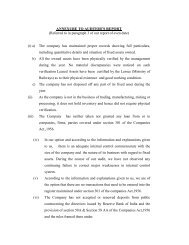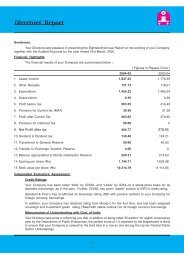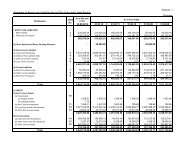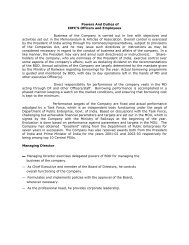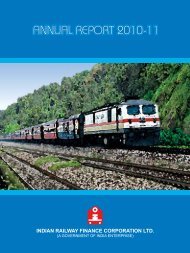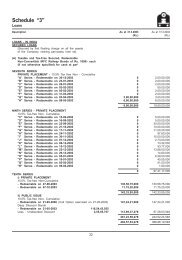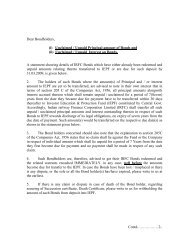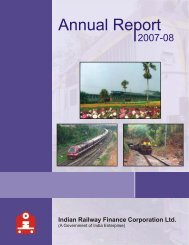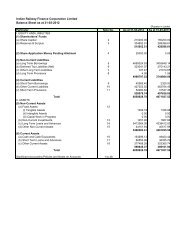INDIAN RAILWAY FINANCE CORPORATION LIMITED
INDIAN RAILWAY FINANCE CORPORATION LIMITED
INDIAN RAILWAY FINANCE CORPORATION LIMITED
You also want an ePaper? Increase the reach of your titles
YUMPU automatically turns print PDFs into web optimized ePapers that Google loves.
(c) Under Section 54 EC of the I.T. Act and subject to the conditions and to the extent specified therein, longterm capital gains arising to the bondholders on transfer of their bonds in the company shall not bechargeable to tax to the extent such capital gains are invested in certain notified bonds within six monthsfrom the date of transfer. If only part of the capital gain is so invested, the exemption shall beproportionately reduced. However, if the said notified bonds are transferred or converted into money withina period of three years from their date of acquisition,The amount of capital gains exempted earlier would become chargeable to tax as long term capital gains inthe year in which the bonds are transferred or converted into money. Where the benefit of Section 54 EC ofthe I.T. Act has been availed of on investments in the notified bonds, a deduction from the income withreference to such cost shall not be allowed under Section 80 C of the I.T. Act. The investment made in thenotified bonds by an assessee in any financial year cannot exceed Rs. 50 lakhs.(d) As per the provisions of section 54F of the Income Tax Act, 1961 and subject to conditions specifiedtherein, any long-term capital gains (not being residential house) arising to Bond Holder who is anindividual or Hindu Undivided Family, are exempt from capital gains tax if the entire net salesconsiderations is utilized, within a period of one year before, or two years after the date of transfer, inpurchase of a new residential house, or for construction of residential house within three years from the dateof transfer. If part of such net sales consideration is invested within the prescribed period in a residentialhouse, then such gains would be chargeable to tax on a proportionate basis.Provided that the said Bond Holder should not own more than one residential house at the time of suchtransfer. If the residential house in which the investment has been made is transferred within a period ofthree years from the date of its purchase or construction, the amount of capital gains tax exempted earlierwould become chargeable to tax as long term capital gains in the year in which such residential house istransferred. Similarly, if the Bond Holder purchases within a period of two years or constructs within aperiod of three years after the date of transfer of capital asset, another residential house (other than the newresidential house referred above), then the original exemption will be taxed as capital gains in the year inwhich the additional residential house is acquired.(e) The income by way of short term capital gains or long term capital gains (not covered under Section 10(38)of the IT Act) realized by FIIs on sale of security in the Company would be taxed at the following rates asper Section 115AD of the I.T. Act.Short term capital gains- 30% (plus applicable surcharge and education cess).Long term capital gains - 10% without cost indexation (plus applicable surcharge and education cess)As per section 90(2) of the IT Act, the provision of the IT Act would not prevail over the provision of thetax treaty applicable to the non-resident to the extent such tax treaty provisions are more beneficial to thenon resident. Thus, a non resident can opt to be governed by the beneficial provisions of an applicable taxtreaty3. PROFIT AND LOSSIn case the Bonds are held as stock in trade, the income on transfer of bonds would be taxed as businessincome or loss in accordance with and subject to the provisions of the I.T. Act.4. TAXATION ON GIFTAs per section 56(2) (vii) of the I.T. Act, in case where individual or Hindu undivided Family receivesbond from any person on or after 1st October, 2009A. without any consideration, aggregate fair market value of which exceeds fifty thousand rupees, then thewhole of the aggregate fair market value of such bonds/debentures or;B. for a consideration which is less than the aggregate fair market value of the Bond by an amountexceeding fifty thousand rupees, then the aggregate fair market value of such property as exceeds suchconsideration;shall be taxable as the income of the recipient.33



